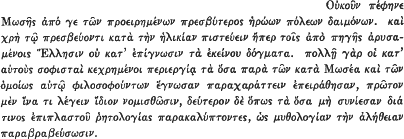No CrossRef data available.
Published online by Cambridge University Press: 31 August 2011
Tatian, adv. Graecos 40 (p. 41, 1-10 Schwartz): 
The argument of this passage follows a line familiar to readers of the apologists: the Hebrew Lawgiver and the prophets belonged to an earlier age than the wise men of Greece, who borrowed Hebrew wisdom and perverted it in one way or another. Leaving one word purposely untranslated, we may render the last sentence, “For their sophists, tampering freely with what they had learned from Moses and those who shared his philosophy, tried to give it a false stamp, first, in order that they might be credited with saying something of their own, and secondly, that they might cloak what they did not understand with some fictitious ῥητολογία and unfairly represent the truth as a fable.”
1 Praep. Evang. 10, 11, p. 495 a.
2 Stephanus’ Thesaurus cites several examples from the Etymologicum Magnum; p. 94, 40 will serve the purpose.
3 The meaning “text” occurs also in secular language, as Schol. Odyss. A, 166.
4 Mayser, Gram. d. griech. Pap. I, 143–145.
5 Mayser, I, 64 ff.